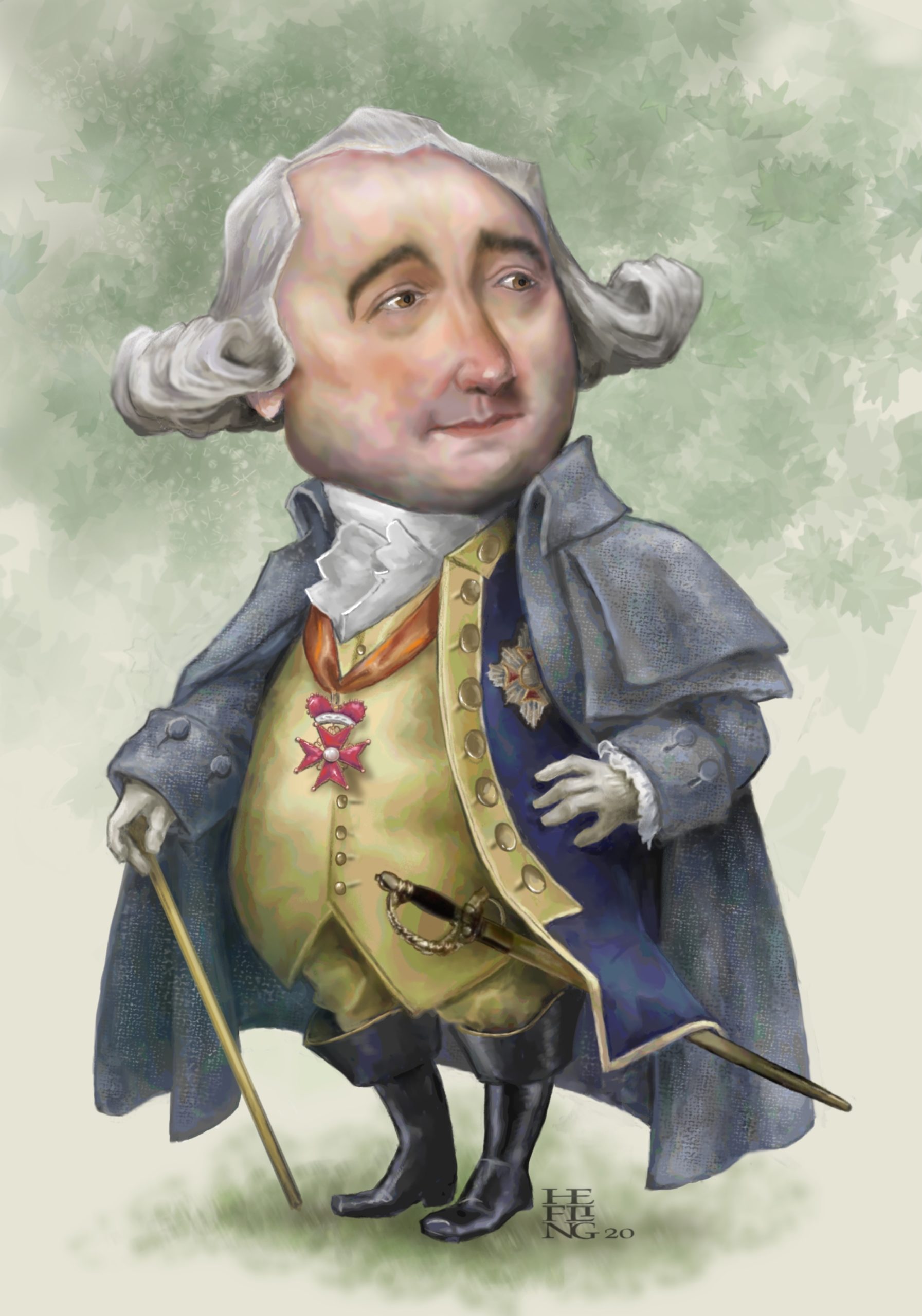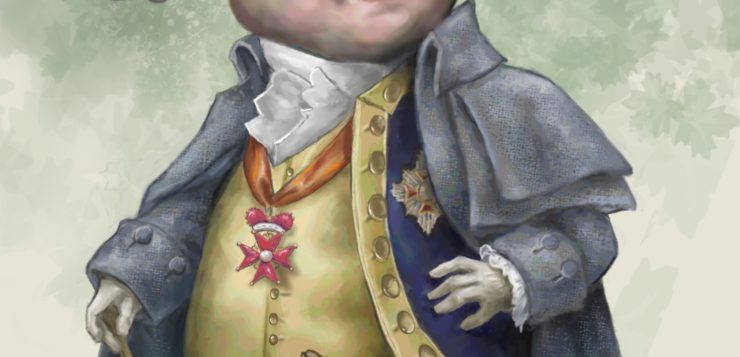BARON VON STEUBEN was a Prussian military officer who arrived in America during the darkest hour of the Revolutionary War to train George Washington’s bedraggled troops at Valley Forge, Pennsylvania. Throughout the bitter winter of 1777–78, the Continental Army thrived under Steuben’s influence, and by the time it mobilized in the spring to resume the war, it had been molded into a powerful force, its morale restored. The Continentals fought the British to a draw at the Battle of Monmouth (New Jersey) and then went on to win a succession of victories.
Many historians consider Steuben to be one of the indispensable heroes of the American Revolution. His ideas and techniques remained U.S. military orthodoxy for decades after his tour of duty. Nonetheless, because American revolutionary mythology cannot assimilate the dual anomalies of foreignness and gayness, most Americans have never heard of him. It is a suitable moment to reassess Steuben and give him the historical prominence he deserves.
Baron Friedrich Wilhelm Steuben joined the Prussian army when he was seventeen, eventually becoming an aide-de-camp to Frederick the Great, who was also rumored to have had homosexual leanings. (The conversation of Frederick’s inner court circle was peppered with homoerotic banter, and his residence included a Friendship Temple celebrating the homoerotic attachments of Greek antiquity). Discharged under a cloud, hounded by accusations of having relations with young men, Steuben, by now a chancellor to an indebted prince, began to look around for more lucrative employment in foreign armies. In the summer of 1777, with his funds dwindling, his search for work took him to Paris. There the French minister of war introduced him to Benjamin Franklin, who was seeking experienced military officers for the war with the English.
Perhaps realizing that his future in Europe was finished, Steuben accepted Franklin’s offer to come to America. Franklin in turn passed on word of Steuben’s availability to George Washington. Around this time, Steuben had found a new young male acquaintance in Paris. This was a certain Pierre-Étienne Du Ponceau, an exceptional linguist who had been living on his own, teaching Latin and doing freelance translation work. The youth, who had just turned seventeen around the time of their first meeting, became Steuben’s interpreter, live-in personal secretary, and, quite possibly, his lover.

Washington had done his best to establish order at Valley Forge. He had designed the layout of the camp himself, down to each road and barrack. Soldiers who did not use proper privies were to be given five lashes on the spot. Soldiers that contracted venereal disease from the prostitutes haunting the edge of the camp were to pay for their own treatment (four dollars for the rank and file, ten for the officers). Nevertheless, so severe were conditions at Valley Forge that Washington despaired that “unless some great and capital change suddenly takes place … this Army must inevitably … starve, dissolve, or disperse, in order to obtain subsistence in the best manner they can.” On February 23, 1778, Washington rode out of Valley Forge to meet the would-be reformer of the Continental Army. When he finally met Steuben on the road from York, the Baron was “dressed in the crisp uniform of a Prussian general with a jeweled medallion across his chest.”
The soldiers at Valley Forge were not accustomed to the Baron’s style. Steuben showed up in a grandiose sleigh, sporting 24 jingling bells, pulled by black Percheron draft horses. The Baron was wearing a robe of silk trimmed with fur, all the while petting his miniature greyhound, Azor, who was curled up on his lap. Behind him were his retinue, his French aide-de-camp Louis de Pontière, and the Baron’s seventeen-year-old “secretary” Pierre-Étienne du Ponceau. One soldier’s first impression of the Baron was “of the ancient fabled God of War. … The trappings of his horse, the enormous holsters of his pistols, his large size, and his strikingly martial aspect, all seemed to favor the idea.”
With the war going badly, General Washington had chosen Valley Forge as a secure location for the winter of 1777–78. The area was close enough to the British to keep their raiding and foraging parties out of the interior of Pennsylvania, yet far enough away to halt the threat of British surprise attacks. When the 12,000 poorly fed, ill-equipped Continentals, weary from long marches, had staggered into Valley Forge, only about one in three of them had shoes, and many of their feet had left bloody footprints from the marching. Soldiers subsisted on inadequate supplies of meat and bread, some getting their only nourishment from “firecake,” a tasteless mixture of flour and water. Alternating freezing and melting of snow and ice made it impossible to keep dry. Hundreds of horses either starved to death or died of exhaustion. Clothing was wholly inadequate. Many wounded soldiers from previous battles died from exposure. Blankets were scarce. Tattered garments were seldom replaced. At one point these shortages caused nearly 4,000 men to be listed as unfit for duty.
Living in crowded, damp quarters, the Army was ravaged by sickness and disease. Typhoid, typhus, smallpox, dysentery, and pneumonia were rife. Disease, malnutrition, and exposure claimed two-and-a-half thousand soldiers by the end of the winter. Hundreds of others deserted as hardships at camp overcame their motivation and dedication to fight for the cause of liberty. The American public, along with Congress, began to criticize Washington for his inability to advance the war effort. There were even grumblings amongst a scattering of troops that Washington ought to be replaced.
Entering this environment, Steuben, who did not speak English but was prone to deliberate and slow cursing in multiple languages, drafted a drill manual in French, which Alexander Hamilton and Nathanael Greene then translated into English. At the time, each state used different drills and maneuvers, patterned upon various European methods. Steuben’s task was to create one standard method, thus coordinating the entire Continental Army. Some 120 soldiers were put through their paces and, upon completion, were assigned to teach the drills to others. The Prussian drill techniques that Steuben shared were far more advanced than those of other European armies, let alone those of the ragtag Patriots. The ego-crushing methods of modern boot camp were practiced among the shoeless soldiers of Valley Forge with remarkable efficacy. The soldiers learned how to form solid, orderly columns, how to attack in formation, and how to use bayonets properly. Most important for 18th-century battle was an efficient method of firing and reloading weapons, which Steuben forced the Patriots to practice until it became second nature.
Steuben insisted on reorganization to establish basic hygiene. He demanded that kitchens and latrines be put on opposite sides of the camp, with latrines facing a downhill slope. (Just having latrines was a novelty for the Continental troops, who were accustomed to living among their own filth.)
When the Continental Army finally marched out of Valley Forge in June 1778, the well-trained Americans nearly bested the British at Monmouth. While British Lieutenant General Charles Cornwallis successfully protected the withdrawal of the main British column, Washington had fought his opponent to a standstill after a pitched and prolonged engagement—the first time that Washington’s army had achieved such a result. The battle demonstrated the growing effectiveness of the Continental Army after its six-month encampment. The Americans were ultimately left in possession of the field, and had for the first time demonstrated that the Continental Army regiments could stand against British regulars. There was the sense that things were changing for the better, even that the tide might just be starting to turn. On the merit of his efforts at Valley Forge, Washington recommended that Steuben be named inspector general of the Continental Army. Congress complied.
After the war, Steuben legally adopted two young soldiers. (One of them, William North, would become a U.S. Senator.) A third young man, John Mulligan, considered himself a member of the stable of Steuben’s youths. Before moving in with Steuben, Mulligan had been living with Charles Adams, the son of then-Vice President John Adams. The latter was concerned about the intense “closeness” between his son and Mulligan, insisting that they separate, so Mulligan wrote to Steuben with his tale of despair. Steuben offered to take both men into his home. His letter to the boys is extraordinarily gushing for a gruff military veteran: “I repeat my entreaties, to hasten your journey to Philadelphia as soon as your strength permits. My heart and my arms are open to receive you. In the midst of the attention and fêtes which they have the goodness to give me, I enjoy not a moment’s tranquility until I hold you in my arms.”
Such emotional relationships were not as unusual in the 18th and 19th centuries as they would be today. Nevertheless, even by the standards of those chivalrous, chastely romantic times, Steuben’s correspondence and intimate relationships, and the fact that he was never married, paint a compelling picture of a man that we would recognize as “gay.”
There is a statue of Baron von Steuben in Lafayette Square in Washington, D.C. It’s a tall, bronze, life-size statue placed upon a high stone pedestal. The statue shows Steuben in military dress uniform surveying the troops at Valley Forge. At the rear of the pedestal is a medallion with images of Steuben’s adopted aides-de-camp, William North and Benjamin Walker. The plaque reads: “Colonel William North—Major Benjamin Walker—Aides and Friends of Steuben.” On each side of the pedestal are bronze Roman soldiers. Above the carved words “Military Instruction” on one side is a seated, helmeted Roman soldier “instructing” a naked youth. The evidence suggests that Steuben, a figure who indisputably helped turn the tide of the Revolutionary war at a critical, desperate time, would have liked this monument very much.







Discussion1 Comment
Baron von Steuben is viewed as the father of the Inspector General (IG) corps. As a trained IG, I find it interesting that we were often tasked to investigate allegations of “homosexuality.” Personally, I only found gays who were already caught by the system. I would ask the person I was sent to investigate if he/she wanted to get out of the military. If they did not, I coached the person on how to keep from being caught again. I provided a path and coached behaviors to help some get out without stigma. I concealed my own status as transgender because I was only asked about being a “homosexual” when I took regular Lie Detector Tests, which my clearances required.
Please do not use my name because when I helped others it was still against regulations.